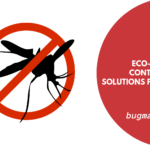
In recent years, there has been a growing concern about the harmful effects of traditional pest control methods on the environment and human health.
As a result, many homeowners are seeking alternative solutions that are both effective in pest management and Eco-friendly. This article aims to explore various natural pest control methods that can help create a greener home environment.
Why Choose Eco-Friendly Pest Control?
Traditional pest control methods often involve the use of harsh chemicals and pesticides that not only harm pests but also pose risks to human health and the environment.
By opting for Eco-friendly pest control solutions, homeowners can mitigate these risks and contribute to a greener and healthier planet. Eco-friendly pest control methods are designed to target pests while minimizing the impact on beneficial organisms and the overall ecosystem.
Identifying Common Household Pests
Before implementing any pest control measures, it’s essential to identify the pests that infest your home. Common household pests include ants, cockroaches, mosquitoes, flies, spiders, and rodents. Understanding their behavior, life cycle, and habitat will help you choose the most appropriate Eco-friendly control methods.
Prevention is Key
The first step in Eco-friendly pest control is prevention. By adopting preventive measures, you can reduce the likelihood of pests entering your home. Seal any cracks or gaps in walls, windows, and doors to prevent their entry. Keep your home clean and tidy, eliminating food and water sources that attract pests. Regularly inspect and maintain your garden to prevent pest infestations from spreading.
Natural Pest Control Methods
Biological Pest Control
Biological pest control involves introducing natural predators or parasites that feed on pests, effectively controlling their population. Ladybugs, nematodes, and certain types of bacteria are commonly used in biological pest control. These organisms offer a sustainable and eco-friendly approach to pest management.
Essential Oils and Botanical Extracts
Many essential oils and botanical extracts possess insecticidal properties and can be used as natural pesticides. Peppermint oil, neem oil, and tea tree oil are examples of natural remedies that repel and kill pests. These substances are safe for humans and pets while being effective against a wide range of pests.
DIY Traps and Barriers
Simple traps and barriers can be created using household items to catch and deter pests. For example, a mixture of sugar and borax can be used to attract and eliminate ants. Copper tape can be applied around plant pots to prevent slugs and snails from reaching them. These DIY methods offer an inexpensive and environmentally friendly way to control pests.
Beneficial Insects
Introducing beneficial insects into your garden can help control pest populations. Ladybugs, lacewings, and praying mantises are natural predators of many garden pests. By creating a welcoming environment for these beneficial insects, you can maintain a natural balance and reduce the need for chemical pesticides.
Physical Exclusion
Physical exclusion involves sealing off entry points and creating barriers to prevent pests from entering your home. Install screens on windows and doors to keep out insects and repair any cracks or holes in walls and foundations. This method is highly effective in preventing pest infestations without the use of chemicals.
Proper Waste Management
Proper waste management is crucial in deterring pests. Dispose of garbage regularly and keep trash bins tightly sealed. Avoid leaving food scraps or pet food exposed, as they attract pests. By maintaining good hygiene practices, you can significantly reduce the chances of pests finding their way into your home.
Maintaining a Healthy Garden
A well-maintained garden is less susceptible to pest infestations. Encourage plant diversity and use companion planting techniques to naturally repel pests. Regularly remove weeds and debris, as they provide hiding places for pests. Proper watering and fertilization practices will ensure the health and resilience of your plants, making them less vulnerable to pest attacks.
Eco-Friendly Pest Control Products
There are numerous eco-friendly pest control products available on the market. Look for products that are labeled as organic, natural, or eco-friendly. These products are formulated using plant-based ingredients and pose minimal risks to human health and the environment. Always follow the instructions carefully when using any pest control product.
The Role of Professionals in Eco-Friendly Pest Control
If you’re dealing with a severe pest infestation or prefer expert assistance, consider hiring professionals specializing in Eco-friendly pest control. These professionals are trained in using environmentally friendly methods and can help identify the root causes of pest issues. They will tailor a pest management plan that suits your specific needs while prioritizing Eco-friendly solutions.
Creating a Pest-Free Indoor Environment
To maintain a pest-free indoor environment, practice good sanitation habits. Clean up spills promptly, store food in airtight containers, and regularly vacuum and sweep floors. Fix leaky pipes and address any moisture issues, as damp areas attract pests. By following these practices, you can create an environment that is less attractive to pests.
FAQs (Frequently Asked Questions)
Are eco-friendly pest control methods as effective as traditional methods?
Yes, eco-friendly pest control methods can be just as effective in managing pests. However, they may require more consistent application and preventive measures to maintain long-term control.
Are natural pesticides safe for pets and children?
Most natural pesticides are safe for pets and children when used according to instructions. However, it’s always best to exercise caution and keep them away from treated areas until the product has dried or settled.
Can I use eco-friendly pest control methods in commercial settings?
Yes, eco-friendly pest control methods can be used in commercial settings. Many businesses are embracing sustainable practices, and eco-friendly pest control aligns with their environmental goals.
Related Reads: Pest control dhanmondi & Pest control uttara
Conclusion
Eco-friendly pest control provides a sustainable and effective approach to managing pests while preserving the environment and safeguarding human health.
By implementing preventive measures, using natural pest control methods, and maintaining a healthy garden, homeowners can create a greener home environment free from harmful chemicals. Embracing eco-friendly pest control not only protects your home but also contributes to the overall well-being of the planet.
